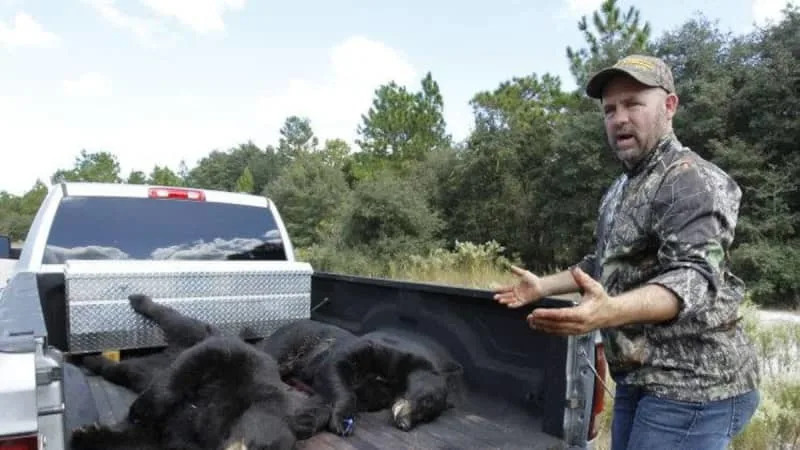
For the first time since 2015, a Florida black bear hunt is returning.
After months of contentious public debate, Florida’s wildlife commissioners voted unanimously Wednesday to approve a 23-day bear hunt in December that will allow for up to 187 bears to be killed. The commission also laid the groundwork for future bear hunting seasons.
Since the prospect of a new hunt first emerged eight months ago, several key questions have remained at the center of the conversation, including whether the state’s bear population is too high or too low, what methods should be allowed to hunt and whether the decision, overall, is being driven by sound science.
With an estimated 4,000 wild bears in Florida, state wildlife experts with the Florida Fish and Wildlife Conservation Commission say hunting will be an effective tool to manage a growing and healthy population. While their hasn’t been a formal count since 2015, agency staff say their data show bears are expanding their range, a sign the population is growing.
Many conservation groups who have opposed the hunt say it’s premature and point to the chaotic bear hunt a decade ago that was cut short when hunters killed the permitted quota in roughly 48 hours, including nursing mothers.

Some have taken their criticism further, saying the commission — made up mostly by developers — has lost sight of their mission to conserve Florida’s fish and wildlife.
“They think this fight ends today,” said James Scott, the campaign coordinator for the nonprofit Speak Up for Wildlife, referring to the wildlife commissioners. “They are sorely mistaken.”
Hunters will be allowed to bait bears and use dogs, according to the new rules. The rules would divide the state into seven bear management zones, but hunting would be allowed in just four of those areas.
The commission is also creating a program that, beginning in 2026, will allow eligible private landowners with more than 5,000 acres to kill up to three bears on their property if they submit a habitat management plan. The state argues the program, and the opportunity to hunt bears, would incentivize landowners to conserve bear habitat.

Roughly 170 people signed up to speak at the commission’s quarterly meeting in Gadsden County, and public comment lasted more than two hours. Two commission members, Sonya Rood and Albert Maury, weren’t there to vote. Rood was taking a vacation, and Maury’s daughter is getting married, according to chairman Rodney Barreto.
The wildlife agency will issue hunting permits through a random drawing, and anyone eligible can enter their name for a permit as many times as they want at $5 per application, according to the hunt rules.
If selected in the drawing, permits for Floridians will cost $100 and it’ll cost $300 for non-residents, according to the rules. There’s a limit of one permit per person, and no more than 10% of permits will be awarded to non-Floridians.
Travis Thompson, executive director of the conservation nonprofit All Florida, has supported a bear hunt throughout the agency’s decision-making process. On Wednesday, he said the hunt is conservation at work.
“A lot of people would want to say, ‘Hey, whoever shows up with the most people should win’. It’s not how conservation works,” Thompson said. “Conservation is driven by science, and that’s what this agency is doing here today.”

According to the hunt rules, female bears can be killed if they don’t have cubs present. Cubs, or bears that are less than 100 pounds, cannot be hunted.
The commission is running this year’s hunt in December to try to limit the number of females that are killed, potentially leaving cubs orphaned and abandoned. Females are usually in their dens by winter, according to the wildlife agency.
Elizabeth Fleming, a senior Florida representative with Defenders of Wildlife, said while she appreciates the consideration for female bears during the upcoming hunt, the decision overall is misguided.
“We feel that the proposal we’re talking about today is overly ambitious, and we have many concerns,” she told commissioners.
The decision comes just two days after one of the wildlife commissioners, Gary Nicklaus, was replaced on the board. The governor’s office announced Monday afternoon that DeSantis was appointing Joshua Kellam, president of a real estate development firm, The Garcia Companies, to join the commission.
Nicklaus is the son of famed golfer Jack Nicklaus, who last year toured the largest state park in Southeast Florida, Jonathan Dickinson State Park, to see if he could build golf courses there as part of ahighly controversial proposal from the DeSantis administration to develop nine state parks.
Before DeSantis backed down from the plans, Gary Nicklaus released a statement distancing himself from the controversy, writing he didn’t initiate the plan and that he “would never exploit my position for personal gain or for the benefit of my family.”
Jack Nicklaus’ lawyer later confirmed to the Tampa Bay Times that the golfer had toured the park.
The agency has not answered questions from the Times about why Gary Nicklaus left, but reporting from Florida Politics citing unnamed sources indicated that he said he was “uncomfortable” casting a vote on the hunt.
Nicklaus has not responded to multiple text messages, and a spokesperson for the agency, Shannon Knowles, said she didn’t have any information about why he left.
State Rep. Lindsay Cross, a Democrat representing St. Petersburg, said she disagreed with the hunt.
“I am incredibly dissapointed by the decision to approve a trophy bear hunt, including cruel practices like hounding, baiting and archery,” she said in a statement. “Despite wildlife viewing being a draw for millions of tourists and Floridians, the commissioners fail to understand that a live bear is worth more than a dead one.”








Comments